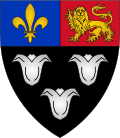Robert Birley
Sir Robert Birley KCMG (14 July 1903 – 22 July 1982) was an English educationalist who was head master of Charterhouse School, then Eton College, and an anti-apartheid campaigner. He acquired the nickname "Red Robert", as even his moderate liberal politics caused concern for the conservative members of the Eton school of governors.[1] His predecessor, Claude Aurelius Elliott was appointed provost and in his capacity as chair of the board of governors, living next door to Birley, he was able to keep an eye on Robert.[1]
Biography
Birley was educated at Rugby and Balliol. He began his career as a history master at Eton in 1926 and in 1935 was appointed as headmaster of Charterhouse. During this time, he was the principal author of the Fleming Report of 1944 on the relationship between the public schools and mainstream education.
In 1947, after the Second World War, Birley became Educational Advisor to the Control Commission in the British Zone in Germany, responsible for educational reconstruction, and played an important role in the rewriting of Nazi history textbooks, removing their racist bent. From 1947 to 1949 he gave important support to Lilo Milchsack who formed the Anglo-German Association to improve post-war relations. Birley returned to support these efforts after he left Germany in 1949.[2]
In 1949, Birley was appointed Head Master of Eton, where he remained until 1963. Also in 1949, he was invited by the BBC to deliver the annual Reith Lectures.[3] The radio broadcasts were titled Britain in Europe: Reflections on the Development of a European Society.[4]
Birley considered the history and future impact of Britain's increasing involvement with Europe. He subsequently became a visiting Professor of education at Witwatersrand University, South Africa from 1964 to 1967. In 1967 he was appointed Professor and Head of Department of Social Science and Humanities at City University a post he held until 1971.[5] He wrote and lectured extensively on education, apartheid and human rights issues and the Robert Birley memorial lectures are a tribute to his contributions.
From 1968 to 1982, Birley was professor of rhetoric at Gresham College, London. He was President of the Bibliographical Society from 1979 to 1980.[6]
Birley's biography, Red Robert: a life of Robert Birley, by Arthur Hearnden, appeared in 1984. A collection of his writings, History and Idealism: Essays, Lectures, Sermons and Letters of Robert Birley, appeared in 1990, edited by his son-in-law, Brian Rees.
Birley family
His grandfather, Arthur Birley (1834–1912), was the brother of Hugh Birley, who served as Member of Parliament for Manchester from 1868 to 1883.[7]
See also
References
- Routledge, Norman. "The Eton Headmaster – 'Red' Robert Birley". Web of Stories – Life Stories of Remarkable People. YouTube. Retrieved 15 April 2020.
- Anne Pimlott Baker, Profile: "Milchsack, Lisalotte 'Lilo' (1905–1992)", Oxford Dictionary of National Biography, Oxford University Press (2004), oxforddnb.com. Retrieved 26 November 2015.
- "The Reith Lectures". BBC Radio 4. UK: BBC. 2 February 2016. Retrieved 28 April 2016.
- "– The Reith Lectures, Robert Birley: Britain in Europe: Reflections on the Development of a European Society: 1949". BBC Radio 4. 14 November 1949. Retrieved 28 April 2016.
- "gb193-bir – Sir Robert Birley; Papers, Mostly on South Africa". Archiveshub.ac.uk. 18 April 2005. Retrieved 28 April 2016.
- "Archived copy". Archived from the original on 4 August 2009. Retrieved 17 August 2012.CS1 maint: archived copy as title (link)
- "David and Linda Birley Genealogies". 2002. Archived from the original on 28 September 2007. Retrieved 10 August 2007. – features references to primary sources
External links
- Page on Birley family genealogy
- Robert Birleys papers regarding anti-apartheid campaign can be found at Borthwick Institute, University of York
- Newspaper clippings about Robert Birley in the 20th Century Press Archives of the ZBW
| Academic offices | ||
|---|---|---|
| Preceded by Claude Aurelius Elliott |
Head Master of Eton College 1949–1964 |
Succeeded by Anthony Chenevix-Trench |
